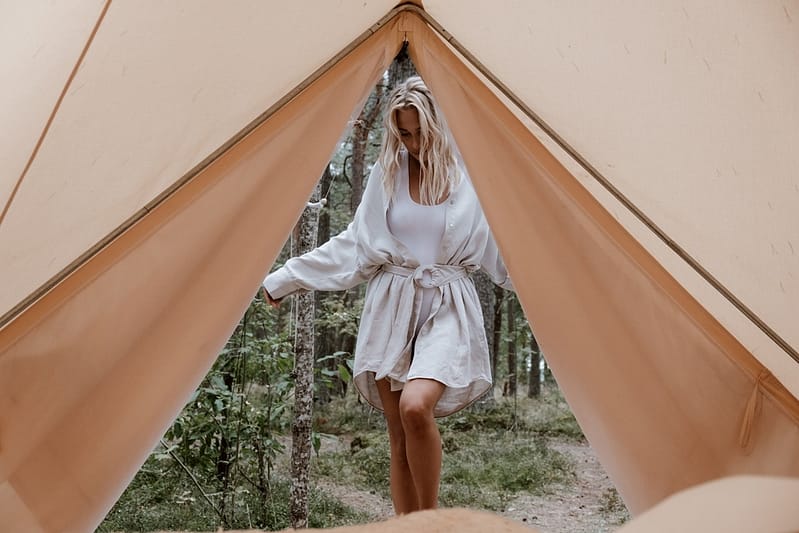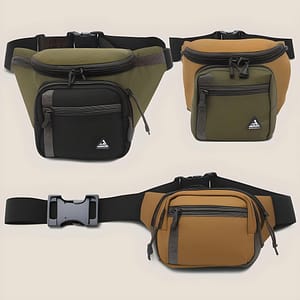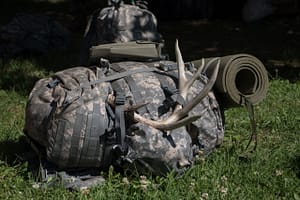Camping is a great experience for almost everyone, regardless of gender, nationality and religion. But even if everyone can enjoy what an experience in nature can offer, there are certain differences in the characteristics of camping that stem from the difference that sets us apart. Most of us have heard of John Gray’s book, Men from Mars and Women from Venus, and while I don’t think the differences in camping between men and women are quite as shown in the book, there is still a uniqueness to camping for women. In this guide for female camping, we will provide you with essential tips and advice to ensure a safe and enjoyable experience. From preparing for your trip to staying safe in the great outdoors, we’ve got you covered every step of the way.
Preparing for Your Camping Trip
1. Essential Gear: When camping alone, it’s important to choose the right gear that suits your needs and preferences. Invest in a reliable tent, sleeping bag, and camping stove. Don’t forget essential items like a headlamp, multi-tool, and portable charger.
2. Safety First: Before embarking on your solo camping, research the campgrounds thoroughly to ensure they have proper security measures in place. Share your itinerary with someone trusted and check-in regularly during your trip. Familiarize yourself with basic self-defense techniques and carry emergency contact numbers at all times.
3.Tips for Solo Adventurers: As a female camper traveling alone, trust your intuition when selecting campsites or interacting with strangers you encounter along the way. It’s always better to be cautious than sorry! Consider joining forums or groups specifically tailored for solo women campers where you can find helpful tips from experienced adventurers like yourself.
Choosing the Right Camping Gear
Selecting the right camping gear is essential for a successful outdoor adventure. When it comes to solo female camping, it becomes even more crucial to choose the appropriate equipment that ensures safety and comfort. Here are some tips on selecting the right gear:
- Selecting a Suitable Tent:
- Consider the size of the tent.
- based on your needs.
- Look for tents with easy setup features.
- Opt for lightweight and compact options for easier transportation.
- Choosing the Appropriate Sleeping Bag:
- Check temperature ratings to ensure you stay warm during cold nights.
- Consider the weight and packability of the sleeping bag.
- Picking The Right Backpack:
- Choose a backpack with adjustable straps suitable for your torso length.
- Opt forbackpacks with compartments and pockets to keep your essentials organized during your trip.
Packing Essentials for Female Campers
1. When it comes to clothing for a solo camping trip, layering is key. Pack lightweight, moisture-wicking base layers that can be easily layered under warmer clothes when needed. Don’t forget to include a waterproof jacket and sturdy hiking boots for added protection in unpredictable weather conditions.
A key tip for female campers is to pack lightweight, moisture-wicking base layers that can easily be layered under warmer clothes when needed.
2. Essential toiletries and personal care items should not be overlooked when packing for a camping trip alone. Bring travel-sized versions of shampoo, soap, toothpaste, and sunscreen to save space in your backpack. Additionally, pack wet wipes or biodegradable toilet paper for convenience during your outdoor adventures.
3. Food and cooking supplies are essential for sustenance on your solo camping journey. Consider bringing non-perishable snacks like nuts or energy bars as well as easy-to-cook meals such as dehydrated options or canned soups that require minimal preparation time and effort.
Researching Campgrounds and Safety Measures
When researching campground options and amenities, take note of the specific features that are important to you as a solo female camper. Look for campgrounds that offer well-lit areas, secure entrances, and 24/7 staff presence. It’s also helpful to read reviews from other campers, especially those who have camped alone or in similar circumstances. Checking safety ratings and reviews can give you valuable insights into the overall safety of a campground before making your final decision.
In addition to choosing safe campgrounds, prioritize your personal safety by considering self-defense tools. It’s always better to be prepared than caught off guard. Consider carrying items like pepper spray or a personal alarm with you during your camping trips. These tools can provide an added layer of security and peace of mind when camping alone in unfamiliar surroundings.
Solo Camping Tips for Women

Informing Others of Your Plans: When embarking on a solo camping trip as a woman, it is crucial to inform someone you trust about your plans. Share your itinerary, including the location and duration of your trip. Provide them with emergency contact details and establish regular check-in times to ensure your safety.
Setting Up Camp Safely: Prioritize finding a well-lit campsite that offers visibility and security. Choose an area near other campers or park rangers for added protection. Always lock your tent when leaving and store valuables out of sight. Keep self-defense tools readily accessible in case of emergencies.
Navigating Common Challenges: As a female camper, it’s important to be prepared for common challenges such as unwanted attention or feeling vulnerable at night. Consider bringing pepper spray or personal alarms for peace of mind. Trust your instincts and practice situational awareness to stay safe throughout the entirety of your trip.
Informing Others of Your Plans
Share your detailed itinerary with a trusted friend or family member to ensure someone knows your whereabouts at all times during your camping adventure. This will provide you with an added layer of safety and peace of mind, as they can alert authorities if you fail to check-in on schedule. Make it a point to establish regular check-in times, so that both parties are aware when to expect communication. Additionally, don’t forget to provide them with emergency contact information in case they need to reach out for any reason. By taking these simple steps, you can stay connected and safe while enjoying the great outdoors solo.
Setting Up Camp Safely
Choose a well-lit and populated camping area, ensuring your safety by camping in an area that is visible to others. Set up your tent away from potential hazards such as cliffs or dead trees, minimizing any risks posed by the environment. Secure your belongings and lock valuables in your car to protect them from theft or damage while you explore the great outdoors.
Navigating Common Challenges
Be prepared for inclement weather by packing appropriate gear. Always check the weather forecast before heading out on your camping adventure and pack accordingly. Make sure to bring waterproof clothing, sturdy shoes, extra layers, and a reliable tent that can withstand rain or wind.
Learn How to: Insulate a Tent: Tips and Tricks for Staying Warm in Winter
Learn basic self-defense techniques for personal safety. While camping alone as a female, it is important to prioritize your safety. Take time to learn simple self-defense moves that can help you feel more confident in any situation. This knowledge will give you peace of mind and empower you during your solo camping trips.
Identify local flora and fauna, including any potentially dangerous species. In order to stay safe during your outdoor excursions, familiarize yourself with the local wildlife in the area where you will be camping. Learn how to identify different plants and animals while paying attention specifically to any potentially dangerous species such as venomous snakes or poison ivy. This knowledge will allow you to take necessary precautions when interacting with nature.
Staying Safe While Camping Alone

Personal Safety Precautions
Choose well-populated campgrounds where there are other campers nearby. This provides an extra layer of safety and reduces the risk of encountering any potential dangers alone.
Share your itinerary with a trusted friend or family member before embarking on your camping trip. In case of emergency or unforeseen circumstances, someone will be aware of your whereabouts and can alert authorities if necessary.
Exercise caution when interacting with strangers while camping alone. While it’s natural to be friendly and open-minded, trust your instincts and maintain personal boundaries to ensure your safety throughout the journey.
Dealing with Wildlife Encounters
Learn about the local wildlife and their behaviors to better understand how to handle encounters. Different animals have different reactions and behaviors, so being knowledgeable can help you stay safe.
- Research the types of wildlife in the area
- Understand typical animal behaviors and signs of aggression
Store food properly to avoid attracting animals. Keeping your food secure will reduce the chances of unwanted visitors.
- Use bear-resistant containers or hang food from a tree at least 10 feet off the ground
- Clean up any scraps or leftovers after meals
Carry bear spray or other deterrents if necessary. Being prepared with a deterrent can provide an extra layer of protection in case you encounter a dangerous animal.
- Carry bear spray in an easily accessible location, such as on your belt or backpack strap
- Understand how to properly use and aim bear spray for maximum effectiveness
Emergency Preparedness
Pack a well-stocked first aid kit to ensure you are prepared for any injuries or medical emergencies that may arise during your camping trip. Knowing how to navigate using a map and compass is essential in case you get lost or need to find your way back to camp. Bringing an emergency shelter or bivy sack will provide you with protection and warmth in unexpected situations.
- Pack a variety of bandages, antiseptic ointment, pain relievers, and other essential medical supplies.
- Familiarize yourself with the basics of map reading and compass navigation before heading out.
- Invest in a lightweight, compact emergency shelter or bivy sack that can easily fit into your backpack.
Enjoying Your Solo Camping Experience

When embarking on a solo camping adventure, it’s crucial to connect with nature and immerse yourself in the surrounding environment. Take time to observe the flora and fauna, breathe in the fresh air, and appreciate the beauty of your surroundings. Engaging in outdoor activities such as hiking or fishing can further enhance your experience. Embrace solitude as an opportunity for self-reflection and personal growth, allowing yourself to disconnect from distractions and truly be present in the moment. By following these tips, female campers can make their solo camping trip an unforgettable experience filled with connection, exploration, and self-discovery.
Connecting with Nature
Choosing a serene and scenic camping location allows female solo camping to immerse themselves in the beauty of nature. From peaceful lakeside views to towering mountain landscapes, these locations provide the perfect backdrop for relaxation and rejuvenation.
Learning about local flora and fauna adds an educational element to your camping experience. By identifying different plant species or observing unique animal behaviors, you can deepen your appreciation for the natural world around you.
Practicing Leave No Trace principles ensures that future generations can also enjoy the wonders of nature. Remembering to pack out all trash, minimizing campfire impacts, and respecting wildlife habitats are crucial steps towards preserving our outdoor spaces for years to come.
Engaging in Outdoor Activities
- Explore nearby trails, immersing yourself in the beauty of nature while hiking.
- Take on new challenges and relax by trying your hand at fishing or kayaking.
- Marvel at the wonders of the night sky as you engage in stargazing under the open sky.
Embracing Solitude and Self-Reflection
Disconnecting from technology for a digital detox can help solo adventurers in female camping to embrace solitude and self-reflection. By stepping away from screens and notifications, one can fully immerse themselves in the tranquility of nature and find inner peace. Journaling is another powerful tool that allows campers to reflect on personal thoughts and experiences, providing an outlet for self-expression. Additionally, practicing mindfulness exercises such as deep breathing or meditation can enhance self-awareness, helping individuals connect with their emotions and gain clarity.
- Disconnect from technology for a digital detox
- Engage in journaling to reflect on personal thoughts and experiences
- Practice mindfulness exercises to enhance self-awareness
When it comes to gear and equipment for female campers make sure you invest in high-quality items that are specifically designed for durability and comfort. Opt for lightweight tents that offer privacy while being easy to set up. A sturdy backpack with proper weight distribution is crucial for long hikes. Additionally consider investing in multi-purpose tools such as utility knives or Swiss Army knives along with reliable outdoor clothing like good-quality hiking boots which will provide maximum support throughout your adventure
What are the best camping items for female campers?
A. Female Urination Device (FUD):
Female urination devices (FUDs) are a game-changer for female campers. These devices allow women to stand up and urinate discreetly, providing convenience and hygiene while camping. FUDs are lightweight, compact, and easy to use, making them an excellent addition to any camping gear list.
Here are some key benefits of using a female urination device:
1. Convenience: FUDs allow women to urinate while standing up, eliminating the need to squat or find a suitable location for privacy. This is especially useful when camping in areas with limited restroom facilities or during long hikes where finding a suitable spot might be challenging.
2. Hygiene: FUDs help maintain personal hygiene by minimizing contact with potentially unsanitary surfaces. They provide a barrier between the user and the ground or public restroom facilities, reducing the risk of exposure to germs or bacteria.
3. Privacy: With a female urination device, women can relieve themselves discreetly without the need for privacy shelters or designated restroom areas. This allows for more flexibility and convenience during camping trips, especially in crowded campgrounds or remote areas.
When choosing a female urination device, consider the following factors:
– Size and weight: Opt for a lightweight and compact device that is easy to carry in your backpack or pocket. Look for models that fold or collapse for convenient storage.
– Material: Choose a device made from durable and easy-to-clean materials like silicone or medical-grade plastic. This ensures longevity and hygiene during
B. Female-specific hygiene products: It’s important to feel fresh and clean while camping.
Pack female-specific hygiene products such as biodegradable wipes, menstrual cups, or tampons. These items are compact and easy to carry, ensuring you stay comfortable throughout your trip.
Make sure to include the following items:
1. Biodegradable Wipes: Biodegradable wipes are a convenient and eco-friendly option for maintaining personal hygiene while camping. Look for wipes that are specifically designed for sensitive skin and are free from harsh chemicals. These wipes can be used for freshening up, cleaning your hands, or even wiping down camping equipment.
2. Menstrual Cups: Menstrual cups are an excellent alternative to tampons or pads while camping. They are reusable, easy to clean, and can be worn for up to 12 hours without needing to be changed. Menstrual cups are also more environmentally friendly since they produce less waste compared to disposable period products.
3. Tampons: If you prefer using tampons, make sure to pack an adequate supply for the duration of your camping trip. Opt for tampons with a compact design, as they are easier to pack and carry. Additionally, consider using tampons with biodegradable or organic materials to minimize environmental impact.
4. Disposable Bags: When disposing of used hygiene products, it’s important to do so properly to minimize environmental impact. Pack a few disposable bags specifically designated for this purpose. These bags will keep your used hygiene products secure and can be disposed of responsibly.
C. Quick-dry towels: Quick-dry towels are a must-have item for camping trips. Traditional towels can be bulky and take a long time to dry, which can be inconvenient when camping. Quick-dry towels, on the other hand, are designed to dry quickly, making them perfect for outdoor activities.
When choosing a quick-dry towel, there are a few factors to consider. First, look for a towel made from a lightweight and absorbent material. Microfiber towels are a popular choice for camping because they are lightweight, compact, and highly absorbent. They also dry quickly and are easy to pack.
Next, consider the size of the towel. Campers often prefer larger towels for maximum coverage, but keep in mind that larger towels may take longer to dry. If you are concerned about space or weight in your backpack, opt for a smaller towel that can still get the job done.
Additionally, look for a towel with a hanging loop or a built-in attachment for easy drying. This will allow you to hang the towel up to dry after use, preventing it from getting damp or musty.
Lastly, consider the durability of the towel. Camping can be rough on your gear, so choose a towel that is made from durable materials and has reinforced stitching. This will help ensure that your towel lasts through multiple camping trips.
Conclusion
In conclusion, the importance of female camping cannot be overstated. By venturing into the outdoors and embracing nature, women can not only find a sense of peace and serenity but also challenge societal norms and break down gender barriers. Additionally, empowering female adventurers through outdoor experiences fosters personal growth, builds resilience, and enhances self-confidence. Encouraging self-reliance and independence enables women to trust their own abilities while developing valuable survival skills that can be applied in various aspects of life. As more women partake in camping adventures, the world becomes a place where everyone is free to explore without limitations or stereotypes holding them back.





